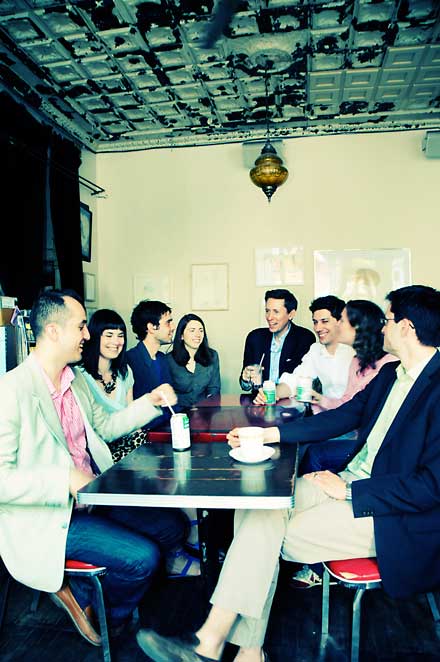
Student-run clinic offers legal services to Montreal’s artistic community
By Pascal Zamprelli
According to the 2006 census, explains recent McGill Law graduate Keith Serry, the average Montreal artist makes about $29,600 per year. According to the Canadian Bar Association, he adds, the average hourly rate for a lawyer in Canada is $254.
“It doesn’t take long to put those two numbers together and realize there’s a gap.”
About two years ago Serry and some classmates met in his living room and starting talking about how to bridge that gap. The result? La Clinique Juridique des Artistes de Montréal (CJAM), a “virtual organization” – they are hoping to eventually get the funding for office space – made up primarily of law students from all of Montreal’s law faculties, that provides free legal information to the city’s artistic community.
Before coming to Montreal in 2005, Serry had helped establish a musicians’ lobby group in Ottawa, where he found that what many successful musicians had in common was that they had managed to hold on to the most valuable parts of their business – intellectual property and publishing rights – and thus make a good living. “But to do that,” said Serry, “you have to know what those things are and you have to take advantage of them.”
So Serry and his colleagues conceived of CJAM with the aim of encouraging creative people to take control, and advantage of, the “business part” of their careers.
“What we do is try and give artists the basic tools to understand how to go about exploiting their talents in a way that, hopefully, enables them to make a living from those talents.”
To this end, CJAM offers three main “service lines”: providing documentary information (fact sheets written in plain language on legal issues of interest to artists), running workshops for organizations such as festivals, art faculties or artist NGOs, and organizing monthly information sessions where artists can come in, discuss their legal questions and receive information from one of CJAM’s trained jurists a few days later.
“The questions have been as varied as the art being made by the people who ask them,” Serry said, noting they’ve dealt with issues touching on municipal law, corporate law, taxation and contracts, to name a few.
Sounds like pretty heavy stuff for volunteers (“satisfaction of a job well done, and the occasional cup of coffee” make up their compensation), but Serry, a self-described law geek, says “part of the reason we’re doing law in our spare time is because we really like it. Everybody’s pitching in because they buy into the goals of the organization.”
Basically, combine law geeks and a love of art, and you get CJAM.
“We came together around a love for Montreal and its artistic community,” said Serry. “We’re all people who are convinced that art makes a really valuable contribution to our city, and who are also fortunate enough to have skills as jurists. We all think that Montreal is best served by the arts being vital and alive, and we can apply our juridical skills to make that happen.”
The need for this kind of service stems from the fact artists often don’t think about the business aspect of what they do until it’s too late.
“The moment you put brush to canvas, you’re starting a business,” explained Serry. “You’re opening a whole world of fascinating and complicated legal issues. And it’s our hope that this service will help people to contemplate and prepare for those issues before they become problems,” and costly ones at that.
Simply put, “a lot of musicians don’t get into music wanting to learn the best ways to leverage their intellectual property. They want to make music.”
With CJAM’s help, they just might be able to do both.
To learn more, visit www.cjam.info.
